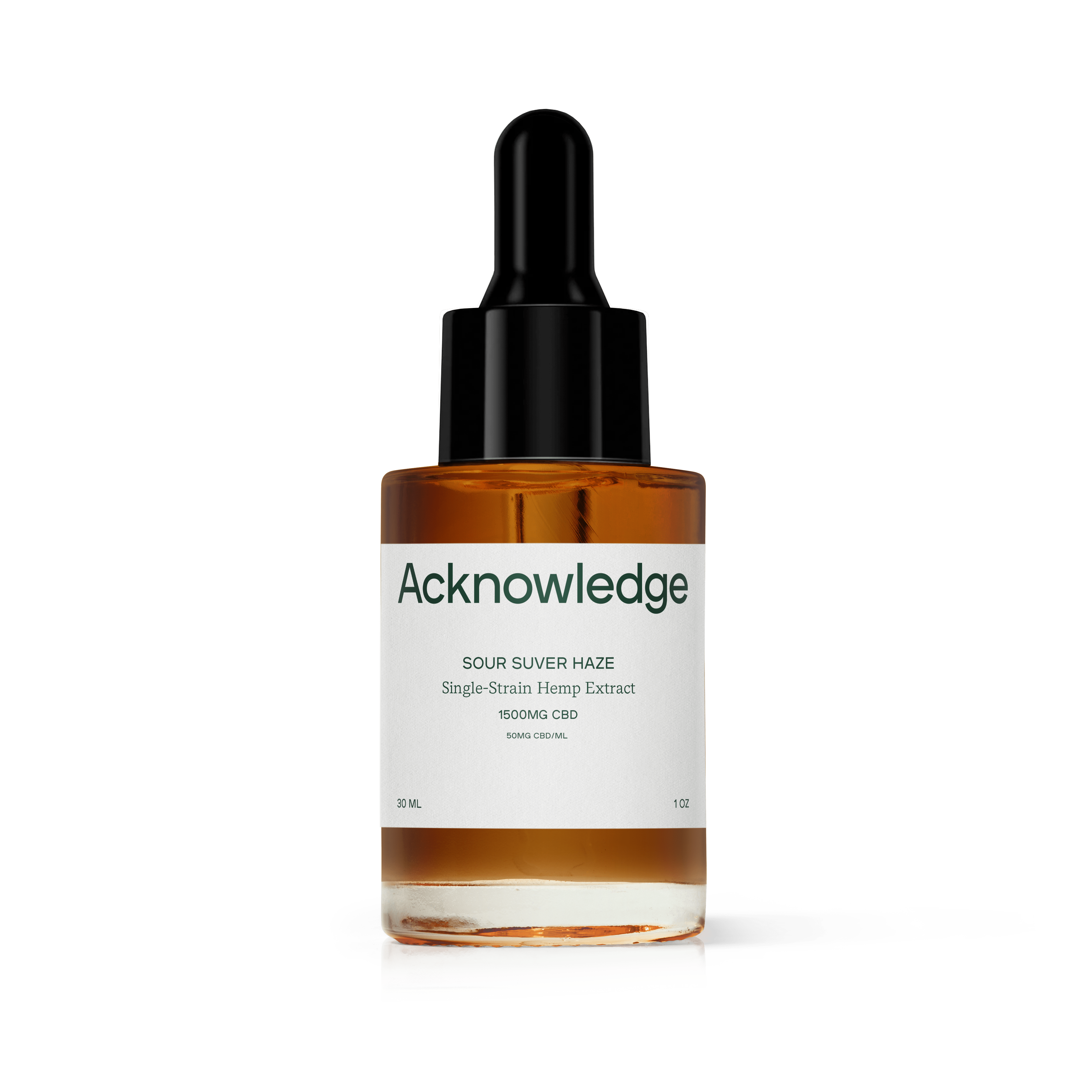
As CBD gets more and more popular, there are more and more options to choose from. And even though full-spectrum CBD is one of the more popular forms of CBD, is it actually “better” than other types? What is the best CBD oil for you?
Let’s explore the benefits of full-spectrum CBD and compare it to other types to find out.
- What is the difference between CBD isolate and full-spectrum CBD?
- How does taking full-spectrum CBD make you feel?
- Should I take full-spectrum CBD?
- What is the most effective form of CBD?
What Is The Difference Between CBD Isolate And Full-Spectrum CBD?
If you’re considering taking CBD, you’ve probably come across two main types: CBD isolate and full-spectrum CBD. Understanding the differences can help you make a more informed decision about which is best for you.
First up, CBD isolate — and it’s just what it sounds like — pure CBD. It doesn’t contain any other compounds from the cannabis plant, such as terpenes, flavonoids, or other cannabinoids. This type of CBD is processed to remove all other compounds, leaving behind just CBD.
Full-spectrum CBD, on the other hand, is a blend of various compounds found in the cannabis plant, including CBD, terpenes, flavonoids, and other cannabinoids. These compounds work together to create a more potent product, known as the “entourage effect.” The idea is that the various compounds in full-spectrum CBD can enhance each other’s effects and create a more powerful product.
CBD isolate is great if you’re looking for a simple, straightforward product. It’s easy to measure the dose and you know exactly how much CBD you’re getting in each serving. CBD isolate is also a good choice if you’re looking for a product that won’t contain any THC, as the other compounds are removed during processing.
Full-spectrum CBD, on the other hand, is a good choice if you’re looking for a more potent product. The various compounds in full-spectrum CBD can enhance each other’s effects and create a more powerful product. Full-spectrum CBD is also a good choice if you’re looking for a product that contains THC, as long as it’s legal in your state and you’re okay with consuming it.
It’s also important to note that everyone is different and may experience different effects from taking CBD isolate or full-spectrum CBD. It’s always best to start with a low dose and gradually increase until you find the right amount that works for you. It’s also important to talk to your doctor before taking CBD, especially if you’re taking other medications.
How Does Taking Full-Spectrum CBD Make You Feel?
Full-spectrum CBD has been gaining a lot of popularity lately for its potential health benefits. But you might be wondering how it actually makes you feel — here’s what you need to know.
First of all, it’s important to note that everyone is unique. You may experience different effects from taking full-spectrum CBD compared to someone else. That being said, here are some of the most common feelings people report after taking full-spectrum CBD.
Relaxation. One of the most commonly reported effects of full-spectrum CBD is a feeling of relaxation. Many people take full-spectrum CBD to help them manage feelings of anxiety and stress, and many report feeling more relaxed and calm after taking it.
Pain relief. Full-spectrum CBD has also been shown to have potential pain-relieving effects. If you’re taking full-spectrum CBD for pain relief, you may experience a reduction in pain and discomfort.
Increased focus and clarity. Some people report feeling more focused and clear-headed after taking full-spectrum CBD. This could be due to its potential effects on anxiety and stress.
Improved sleep. If you’re taking full-spectrum CBD to help you sleep better, you may experience improved sleep quality and wake up feeling more refreshed.
Improved mood. Full-spectrum CBD has also been shown to have potential mood-enhancing effects. Some people report feeling more positive and upbeat after taking it.
Should I Take Full-Spectrum CBD?
Are you curious about full-spectrum CBD and wondering whether it’s right for you? Here’s a quick rundown of the pros and cons to help you make an informed decision.
Pros Of Full-Spectrum CBD
Wider range of benefits. Full-spectrum CBD contains a wider range of cannabinoids and terpenes compared to CBD isolate. This means it may offer a wider range of health benefits, such as reducing anxiety, improving sleep, and managing pain.
Entourage effect. The “entourage effect” refers to the idea that the combination of cannabinoids and terpenes in full-spectrum CBD work together to produce greater benefits than taking CBD isolate alone.
Less processed. Full-spectrum CBD usually isn’t as processed as other types of CBD, which means it retains more of the natural compounds found in the cannabis plant.
Cons Of Full-Spectrum CBD
THC content. Full-spectrum CBD contains trace amounts of THC, which could be a concern for some people, especially if they are subject to drug testing.
Strong taste. Full-spectrum CBD can have a strong, earthy taste that some people find unpleasant.
Price. Full-spectrum CBD products tend to be more expensive than CBD isolate products, which could be a drawback for some people.
What Is The Most Effective Form Of CBD?
If you’re considering taking CBD, you might be wondering what the most effective form is. There are a few different options to choose from, so let’s break them down.
First, there’s CBD isolate. That’s pure CBD without any other compounds from the cannabis plant. This is a great choice if you want a mild, neutral-tasting product without any THC. But, because it doesn’t contain any other cannabinoids or terpenes, it may not offer the same range of benefits as other forms of CBD.
Next, there’s full-spectrum CBD. This type has all the compounds found in the cannabis plant, including trace amounts of THC. Full-spectrum CBD may offer a wider range of benefits because the different cannabinoids and terpenes work together to produce a greater effect. But, the presence of THC could be a concern for some people, especially if they’re subject to drug testing.
Finally, there’s broad-spectrum CBD. It’s similar to full-spectrum CBD, but it doesn’t contain any THC. This makes it a good option if you want the benefits of full-spectrum CBD without the THC.
So, what’s the most effective form of CBD? It depends on your personal preferences and goals. If you’re looking for a mild, neutral-tasting product, CBD isolate is a great choice. If you’re interested in the wider range of benefits that full-spectrum CBD offers, but you’re concerned about the THC, broad-spectrum CBD may be the way to go.
How Acknowledge Products Stand Out
The CBD marketplace is saturated with brands and products, making it hard to know who to trust. At Acknowledge, we set out to create the highest-quality CBD products on the market, made in a sustainable way. With our products, there are no fillers, just high-quality organic ingredients. When you want to know what you are putting in your body, you can trust us. Browse our selection today.
The content provided by Acknowledge CBD is for informational purposes only and is not intended as medical advice. Always consult your healthcare provider before starting any new treatment or if you have any questions regarding a medical condition. Do not disregard professional medical advice or delay seeking it based on information from this site. Reliance on any information provided by Acknowledge CBD is solely at your own risk.
